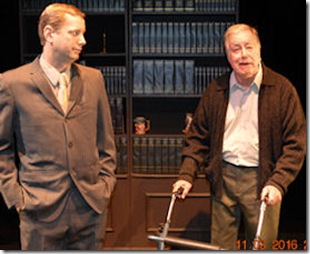Tuesdays with Morrie: a strong reading of a work that helps us understand Lou Gehrig’s disease.
Photo. Barry Caplan
Director John P. Kelly’s experiment with stage effects brings about a new relationship between Morrie and the theatre. The play is based on the memoir Tuesdays with Morrie by the newspaper columnist, radio host, television commentator and sports journalist Mitch Albom who lives and works in Detroit. He and Jeffrey Hatcher adapted Albom’s book into a hit play of the same title, which opened off-Broadway in 2002 and has since been performed in regional theatres across Canada and the USA. It was performed in French at the Théâtre de l’Ile (Gatineau) several years ago with Gilles Provost as Morrie and more recently it became a highly praised performance at the 1000 Islands Playhouse last summer in Gananoque.
The important thing is that this show is not based on a work of fiction. It is a true experience of memory, adapted into a play which takes us on a journey through the final months in the life of Morrie Schwartz, a sociology professor at Brandeis University whom Mitch Albom knew and admired when he studied at that institution. Schwartz knew Angela Davis, Jerry Rubin and all the important protesters during the 1960s neo-romantic revolution. Morrie also introduced Albom to the anti-psychiatry movement of the 1960s epitomized by R.D. Laing’s book The Divided Self which questioned all the principles of modern psychiatry and the notion of madness based on the traditional views of the family. Schwarz was a product of that period, the thinking that is no longer in vogue these days which is why the teachings and aphorisms of the dying sociologist seem so amazingly open and revolutionary and have given rise to such successful discussion on the stage.
